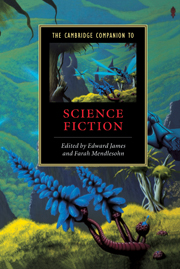Book contents
- Frontmatter
- Introduction
- Part 1 The history
- Part 2 Critical approaches
- Part 3 Sub-genres and themes
- 11 The icons of science fiction
- 12 Science fiction and the life sciences
- 13 Hard science fiction
- 14 Space opera
- 15 Alternate history
- 16 Utopias and anti-utopias
- 17 Politics and science fiction
- 18 Gender in science fiction
- 19 Race and ethnicity in science fiction
- 20 Religion and science fiction
- Further Reading
- Index
- Series List
12 - Science fiction and the life sciences
from Part 3 - Sub-genres and themes
Published online by Cambridge University Press: 28 May 2006
- Frontmatter
- Introduction
- Part 1 The history
- Part 2 Critical approaches
- Part 3 Sub-genres and themes
- 11 The icons of science fiction
- 12 Science fiction and the life sciences
- 13 Hard science fiction
- 14 Space opera
- 15 Alternate history
- 16 Utopias and anti-utopias
- 17 Politics and science fiction
- 18 Gender in science fiction
- 19 Race and ethnicity in science fiction
- 20 Religion and science fiction
- Further Reading
- Index
- Series List
Summary
Since humans are innately biological, and since most sf concerns human beings or other biological life forms, sf writers inevitably make biological assumptions - if only the default assumptions that the planets their fictional space travellers visit will have adequate gravity, air and exotic natives with the right number of chromosomes to interbreed. Such crude assumptions are commonly taken for granted in so-called 'hard science' stories that focus on the physics of space travel or interstellar warfare. Over the past decade, however, writers more often have turned to biology as the 'hard science' frontier of the future. The quest for outer space has given way to the quest for the genome. The great adversary is no longer an alien superpower, but the enemies within - cancer, AIDS, and bio-weapons - as well as the accidental results of genetic manipulation, and our own lifestyle destroying our biosphere. The engineering challenge of the future is less a matter of machines replacing living organisms than of machines imitating life's complexity.
- Type
- Chapter
- Information
- The Cambridge Companion to Science Fiction , pp. 174 - 185Publisher: Cambridge University PressPrint publication year: 2003
- 9
- Cited by



